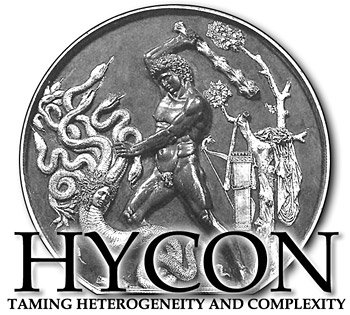-
HYCON: Hybrid Control: Taming Heterogeneity and Complexity of Networked Embedded Systems
 The objective of the NoE HYCON is establishing a durable community of leading researchers and practitioners who develop and apply the hybrid systems approach to the design of networked embedded control systems as found, e.g., in industrial production, transportation systems, generation and distribution of energy, communication systems. Hybrid systems provide a scientific paradigm to systematically address the analysis, modelling, simulation, synthesis, and optimisation of digital controllers for physical plants that communicate directly or via networks with other computerized systems and with human users and supervisors. Malfunction of the control system can lead to drastic performance degradation, severe damage to humans and the environment and cause significant economic losses. The interaction of digital controllers, communication systems and physical plants originates complex dynamic behaviours that cannot be understood intuitively. At present, the development of such systems is based on extensive testing and frequent iterations without guarantee of performance or even safety. HYCON aims at a major advancement of the methodology for the design of such systems and their application in power management, industrial controls, automotive control and communication networks. The long-lasting result will be a European Institute of Hybrid Systems (EIHS), designed to become a worldwide focal point for hybrid systems research. The partners of the network span a broad range of expertise, from applied mathematics and computer science to advanced control applications. They share an integrating approach based on the concept of a dynamical system, which provides the basis for understanding and mastering the complexity and heterogeneity issues arising in the design of large distributed networked embedded control systems. The network will contribute significantly to bridge the gap between traditional control engineering and embedded system design.
The objective of the NoE HYCON is establishing a durable community of leading researchers and practitioners who develop and apply the hybrid systems approach to the design of networked embedded control systems as found, e.g., in industrial production, transportation systems, generation and distribution of energy, communication systems. Hybrid systems provide a scientific paradigm to systematically address the analysis, modelling, simulation, synthesis, and optimisation of digital controllers for physical plants that communicate directly or via networks with other computerized systems and with human users and supervisors. Malfunction of the control system can lead to drastic performance degradation, severe damage to humans and the environment and cause significant economic losses. The interaction of digital controllers, communication systems and physical plants originates complex dynamic behaviours that cannot be understood intuitively. At present, the development of such systems is based on extensive testing and frequent iterations without guarantee of performance or even safety. HYCON aims at a major advancement of the methodology for the design of such systems and their application in power management, industrial controls, automotive control and communication networks. The long-lasting result will be a European Institute of Hybrid Systems (EIHS), designed to become a worldwide focal point for hybrid systems research. The partners of the network span a broad range of expertise, from applied mathematics and computer science to advanced control applications. They share an integrating approach based on the concept of a dynamical system, which provides the basis for understanding and mastering the complexity and heterogeneity issues arising in the design of large distributed networked embedded control systems. The network will contribute significantly to bridge the gap between traditional control engineering and embedded system design.
-
iFly: Safety, Complexity and Responsibility based design and validation of highly automated Air Traffic Management
 iFly is a specific targeted research project within the 6th Framework Programme FP6-2005-Aero-4 (Priority 1.3.1.4.g Aeronautics and Space), funded by the European Commission under contract number TREN/07/FP6AE/S07.71574/037180. During recent years the ATM community research trend is to direct large airborne self separation research projects to situations of less dense airspace. Typical examples of this trend are the EC research projects MFF (Mediterranean Free Flight) and ASSTAR (Advanced Safe Separation Technologies and Algorithms). This trend is remarkable because airborne self separation was originally conceived as a potential solution for high density airspace. iFly aims to develop a step change in this trend, through a systematic exploitation and further development of the advanced mathematical techniques that have emerged within the HYBRIDGE project of EC's 5th Framework Programme. Currently, two schools of researchers exist. Researchers of one school believe that airborne self-separation can safely accommodate traffic levels much greater than current en-route traffic. Researchers of the other school believe that airborne self-separation cannot work safely for high density airspace. Both schools concur that for airspace having sufficiently low traffic densities, airborne self-separation may be safe. From a research perspective this calls for a study which evaluates up to which traffic levels airborne self-separation is safe. This is exactly the key aim of the iFly project. For en-route traffic, iFly has the objective to develop an advanced airborne self separation design together with a vision how the well-equipped aircraft can be integrated within SESAR concept thinking. The goal is to accommodate a three to six times increase in current en-route traffic levels. This incorporates analysis of safety, complexity and pilot/controller responsibilities and assessment of ground and airborne system requirements and which make part of an overall validation plan. The proposed iFly research combines expertise in air transport human factors, safety and economics with analytical and Monte Carlo simulation methodologies providing for "implementation" decision-making, standardisation and regulatory frameworks.
iFly is a specific targeted research project within the 6th Framework Programme FP6-2005-Aero-4 (Priority 1.3.1.4.g Aeronautics and Space), funded by the European Commission under contract number TREN/07/FP6AE/S07.71574/037180. During recent years the ATM community research trend is to direct large airborne self separation research projects to situations of less dense airspace. Typical examples of this trend are the EC research projects MFF (Mediterranean Free Flight) and ASSTAR (Advanced Safe Separation Technologies and Algorithms). This trend is remarkable because airborne self separation was originally conceived as a potential solution for high density airspace. iFly aims to develop a step change in this trend, through a systematic exploitation and further development of the advanced mathematical techniques that have emerged within the HYBRIDGE project of EC's 5th Framework Programme. Currently, two schools of researchers exist. Researchers of one school believe that airborne self-separation can safely accommodate traffic levels much greater than current en-route traffic. Researchers of the other school believe that airborne self-separation cannot work safely for high density airspace. Both schools concur that for airspace having sufficiently low traffic densities, airborne self-separation may be safe. From a research perspective this calls for a study which evaluates up to which traffic levels airborne self-separation is safe. This is exactly the key aim of the iFly project. For en-route traffic, iFly has the objective to develop an advanced airborne self separation design together with a vision how the well-equipped aircraft can be integrated within SESAR concept thinking. The goal is to accommodate a three to six times increase in current en-route traffic levels. This incorporates analysis of safety, complexity and pilot/controller responsibilities and assessment of ground and airborne system requirements and which make part of an overall validation plan. The proposed iFly research combines expertise in air transport human factors, safety and economics with analytical and Monte Carlo simulation methodologies providing for "implementation" decision-making, standardisation and regulatory frameworks.
-
HIBRIDGE: Distributed Control and Stochastic Analysis of Hybrid Systems Supporting Safety Critical Real-Time Systems Design
 HYBRIDGE is a project within the 5th Framework Programme IST-2001-IV.2.1 (iii) (Distributed Control), funded by the European Commission under contract number IST-2001-32460. The 21st century finds Europe facing a number of remarkable changes, many of which involve large complex real-time systems the management and control of which undergoes a natural trend of becoming more and more distributed while at the same time the safety criticality of these systems for human society tends to increase. However good the control design for these systems will be, humans are the only ones carrying responsibility for the operational safety. This implies that control system designs for safety critical operations have to be embedded within sound safety management systems such that the level of safety stays under control of humans. The objective of HYBRIDGE is to develop the methodologies to accomplish this, and to demonstrate their use in support of advanced air traffic management design. In addition to direct application to air traffic management, these contributions form the nucleus for further research and development into a complex, uncertain system theory, and into application of this theory to distributed control of other real time complex systems such as communication, computer and power networks.
HYBRIDGE is a project within the 5th Framework Programme IST-2001-IV.2.1 (iii) (Distributed Control), funded by the European Commission under contract number IST-2001-32460. The 21st century finds Europe facing a number of remarkable changes, many of which involve large complex real-time systems the management and control of which undergoes a natural trend of becoming more and more distributed while at the same time the safety criticality of these systems for human society tends to increase. However good the control design for these systems will be, humans are the only ones carrying responsibility for the operational safety. This implies that control system designs for safety critical operations have to be embedded within sound safety management systems such that the level of safety stays under control of humans. The objective of HYBRIDGE is to develop the methodologies to accomplish this, and to demonstrate their use in support of advanced air traffic management design. In addition to direct application to air traffic management, these contributions form the nucleus for further research and development into a complex, uncertain system theory, and into application of this theory to distributed control of other real time complex systems such as communication, computer and power networks.

Maria Domenica Di Benedetto
Professor of Control Theory at the Department of Electrical and Information Engineering
Director of the Center of Excellence DEWS
University of L'Aquila, Italy
Director of the Center of Excellence DEWS
University of L'Aquila, Italy

© Maria Domenica Di Benedetto | Design: Serious Face by nodethirtythree + Templated.org | Sponsor: Business Website Templates
Design provided by Free Website Templates.